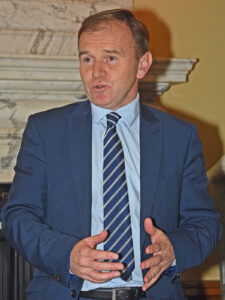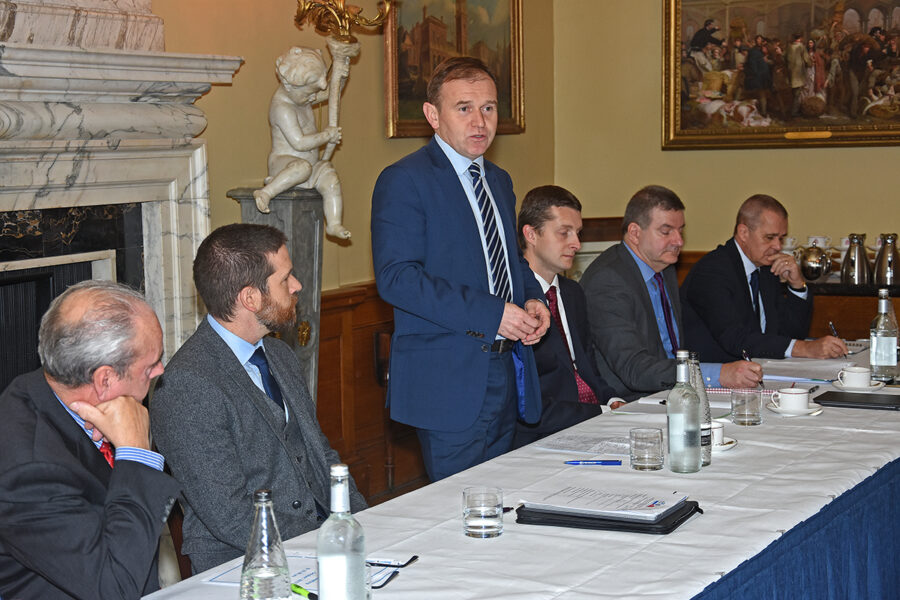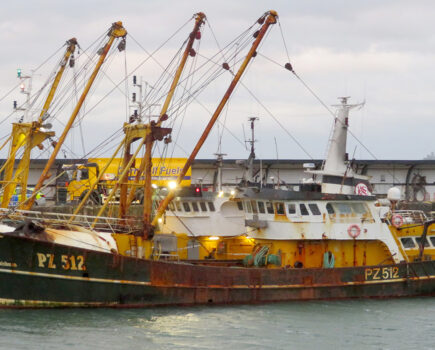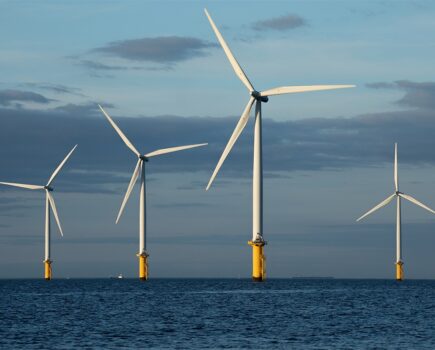Call for debate on effort control v quotas.
UK fisheries minister George Eustice gave an upbeat assessment last week of the prospects for the UK fishing industry after Brexit, reports Tim Oliver.
Above: UK Fisheries Minister George Eustice addressing the NFFO’s AGM, held in Fishmongers’ Hall last week.
He said Brexit presented a great opportunity, but there would be challenges ahead in moving to a new fisheries management regime as an independent coastal state.
He thanked the industry for its input into the work that was going on to develop a new management regime. There was ‘a huge amount of work’ being done, and the government would be publishing a White Paper on the new Fisheries Bill, possibly by the end of the year. Early next year the Bill would be published and introduced.
Addressing the AGM of the NFFO in London, George Eustice said he was ‘really impressed by the level of engagement’ of the industry in the process and the ‘creative thinking’ and ideas put forward.

George Eustice thanked the industry for its input into the work that was going on to develop a new management regime.
He specifically referred to different ways to manage effort and possible replacement of quotas with effort control, and said the industry was ‘realistic’ about this.
He was aware the industry is divided over the issue, and warned that people had expressed the need for caution in making any change from quotas. “This is really important, because we have to have a debate about these issues – we have to air the pros and cons.”
He said quotas worked for pelagic species, but were less suitable in mixed fisheries. He suggested that there might be a ‘hybrid’ solution, with an effort control system for smaller inshore vessels and quotas for larger boats. But the TAC system would have to remain in place because that was the international system of allocating fishing opportunities between different countries.
Commenting on the complexities involved and the dangers of unintended consequences, he quoted a Norwegian fisheries representative who said that ‘fisheries management is not rocket science – it’s way more complicated than that!’
The minister again stressed that the UK would become an independent coastal state when we leave the EU in March 2019, but would work with other countries to manage shared stocks within our 200-mile EEZ/median line. But we would be in charge under the legal framework of UNCLOS; the government’s intention to withdraw from the London Fisheries Convention had sent ‘a clear signal’ that we would be ‘starting with a clean slate’ after Brexit, and would be ‘looking afresh’ at quota shares and access.
A ‘huge amount’ of detailed work was going on, looking at issues such as how quotas and access could be shared with third countries based on zonal attachments (ie, how much fish lives in UK waters) and historic catches. Zonal attachment worked well with demersal stocks, but less well with pelagics.
Turning to the Prime Minister’s speech in Florence, in which she proposed a two-year ‘implementation’ period after the UK leaves the EU in 2019, George Eustice said the speech was an attempt to get negotiations with the EU moving and to ensure that current arrangements could continue for a period to avoid a ‘cliff edge’ for business. He said it wasn’t a ‘hard’ or ‘soft’ Brexit that was needed but ‘a clean Brexit with a soft landing’. Despite media reporting, there was ‘solid progress’ on the Brexit process.
Paul Trebilcock, chief executive of the Cornish FPO, said the industry was concerned about the proposed transition period and asked whether the government aimed to deliver arrangements on access and quotas from ‘Day One’, or more gradually. He said the industry was sceptical because it had been let down badly when we joined the EU, and had not been well looked after by successive ministers and governments since.
The minister said it was an implementation rather than a transition period. There were some areas where the government would want to move quickly to new arrangements, and others where they would want to stay in step with the EU for a time, such as trade and free movement. “We recognise there are some areas where a quick exit is not the way to go,” he said.
On fisheries, the legal position was clear – that we would leave the CFP in March 2019. The question was how to get from the current situation to a new one, and he accepted the situation was a challenge.
Farming and fishing were areas we could take back control sooner rather than later. The legal position that we will be out of the EU and CFP was clear, but the transition period was a different discussion – how to get from the current shares of TACs and access arrangements to something new. Methodologies of doing this had to be worked out, and in the interim period ‘it’s quite possible to say – as we do with pelagics now – that the price of access in this area is inward quota transfers’.
“The reason the industry fears it may be sold down the river in some way, is that we all recognise it’s quite a challenge to move from the relative stability setup we’ve got now, to something that’s quite different. We do need to work out the chronology and methodology of that and how to move from A to B.”
Berried lobsters backlash
Minister George Eustice ran into flak at the NFFO AGM over DEFRA’s shock introduction of a total ban on landing berried lobsters in English waters from 1 October. But he said the ban was justified, and did not back down in the face of heavy criticism.
Gary Hodgson, NFFO shellfish committee chairman, said the sudden closure had caught the industry, NFFO and MMO officers totally unaware. The DEFRA consultation had proposed a ban in 2018, and the legislation was also confusing.

Gary Hodgson, NFFO shellfish committee chairman.
NFFO chairman Mike Cohen, who is also chief executive of the Holderness Fishing Industry Group (HIFG), whose members are almost all shellfishermen, said the ‘vast majority’ of shellfish licence-holders had still not been informed of the ban, and the local IFCA had not known about it. Landings in Holderness were down 40% as a result of the ban, which had been handled ‘in the worst possible way’.
But George Eustice defended the ban. He said it was ‘the right policy’ and the principle of not landing berried lobsters was a ‘no brainer’.
A lot of IFCAs already had a ban, and the absence of a national ban undermined individual IFCA byelaws.
“We’ve been talking about it for probably three years, so it shouldn’t have taken anyone by surprise,” he said. “I don’t think it’s such a big deal.”
Gary Hodgson, who is a shellfish processor and fisherman based in Bridlington, the UK’s leading crustacean shellfish port, replied: “Try telling that to the fishermen in Bridlington”. He said the ban had come at the start of the run-up to Christmas, when prices were high, and on the back of restrictions on vessel sizes inside six miles, escape gaps, pot limitations and crab size increases.
NFFO chief executive Barrie Deas said the way the issue had been handled raised questions about the future relationship of the industry to DEFRA and the MMO.
He and other NFFO leaders had been impressed by the partnership approach to management between government and industry they had seen on a recent visit to Norway. In international negotiations, industry representatives were part of the team and with that came responsibilities as well as opportunities.
“One of the reasons we need this kind of advisory council is to avoid these kinds of shocks,” he said. Intensive talks were being held with DEFRA officials over Brexit, but a Norwegian-style institutionalised partnership approach was needed.
“Ministers will have more power over fisheries legislation after Brexit, and we need a counterbalance to that to avoid unintended consequences of fisheries legislation decisions.”
Further coverage of the NFFO AGM will be included in Fishing News soon.








